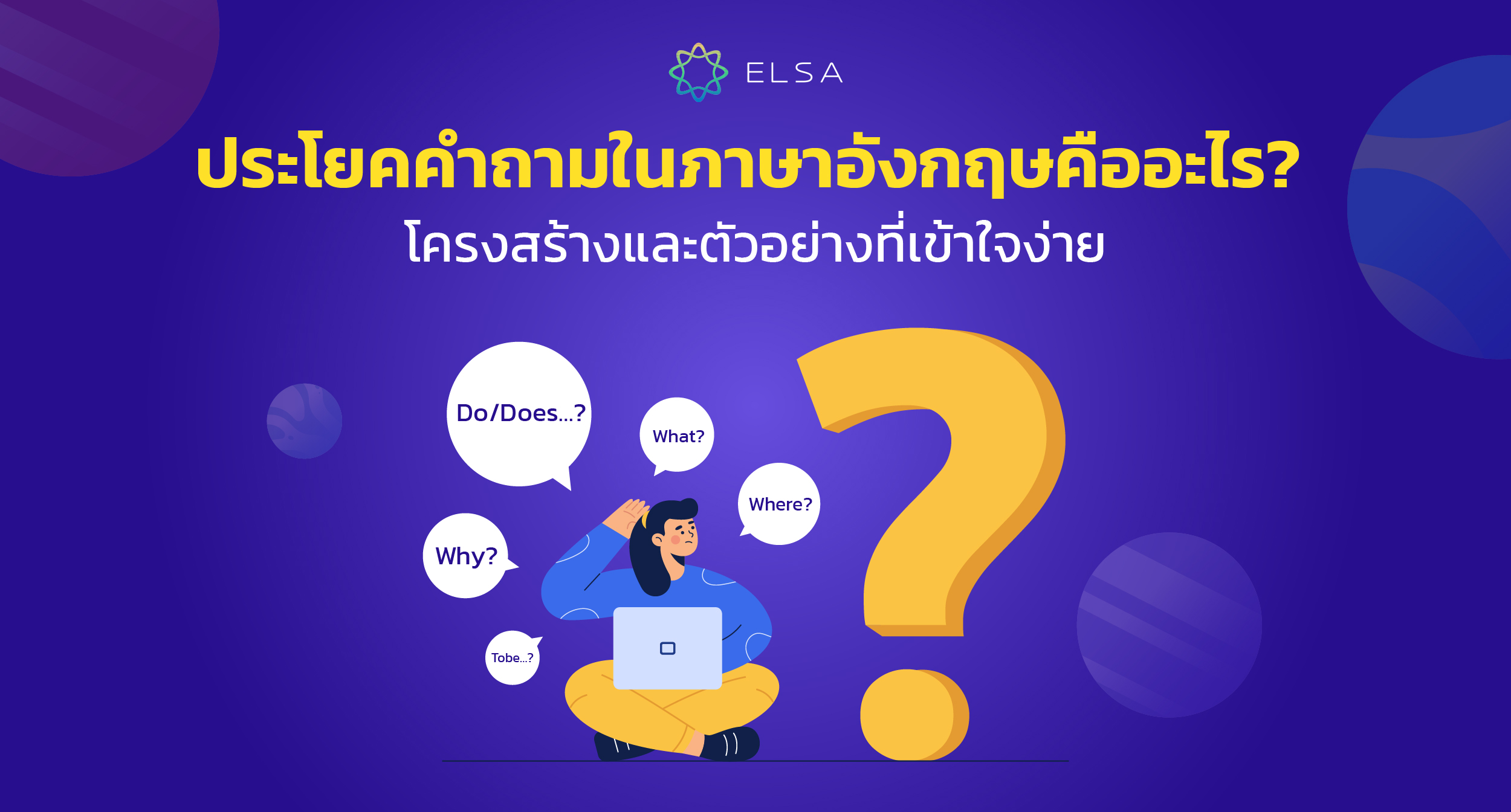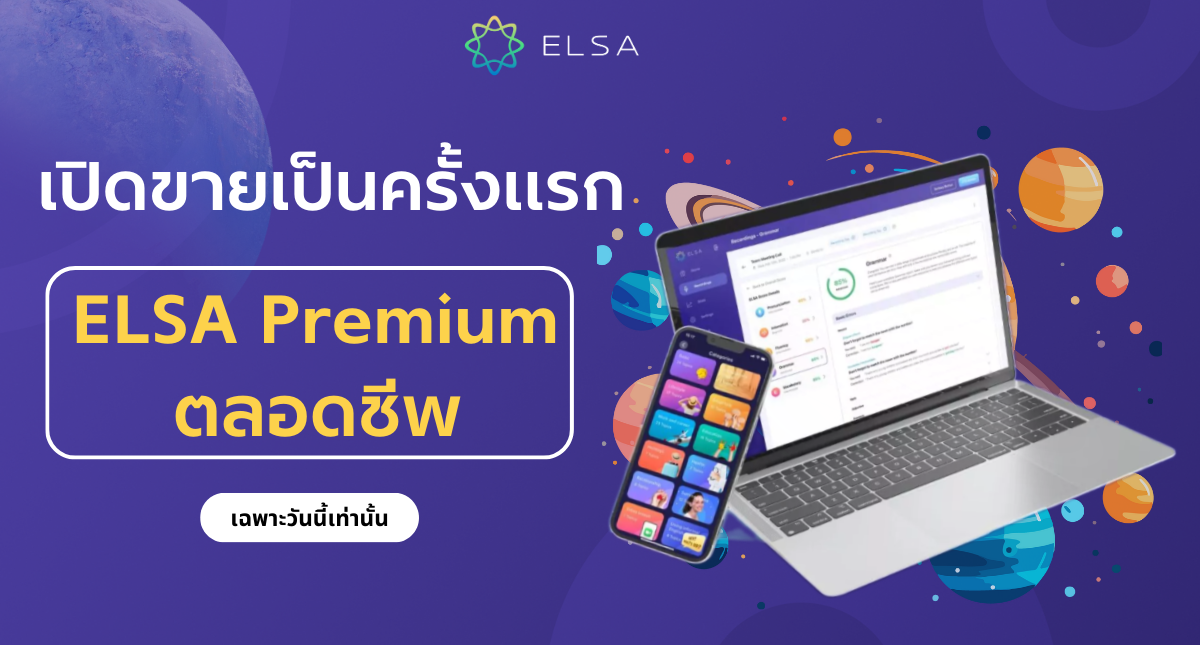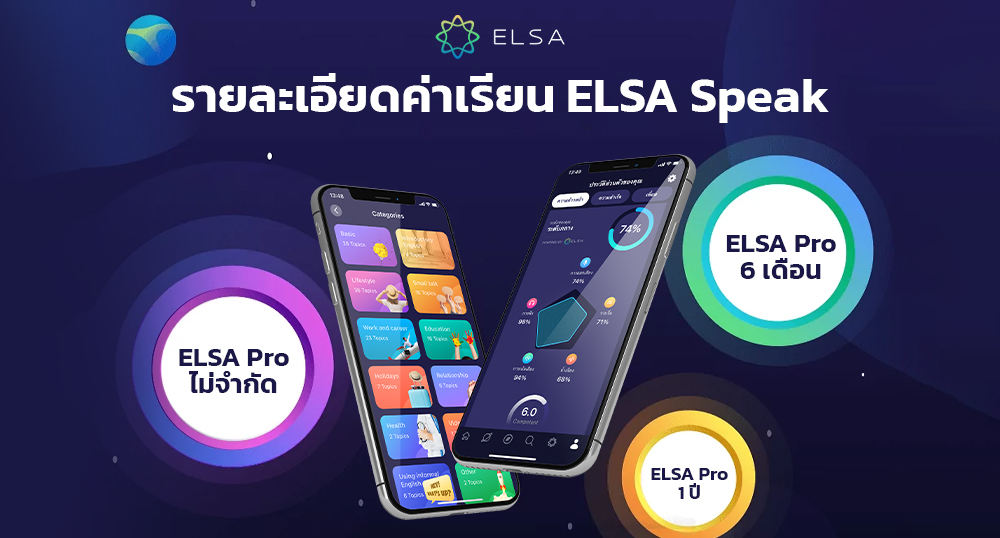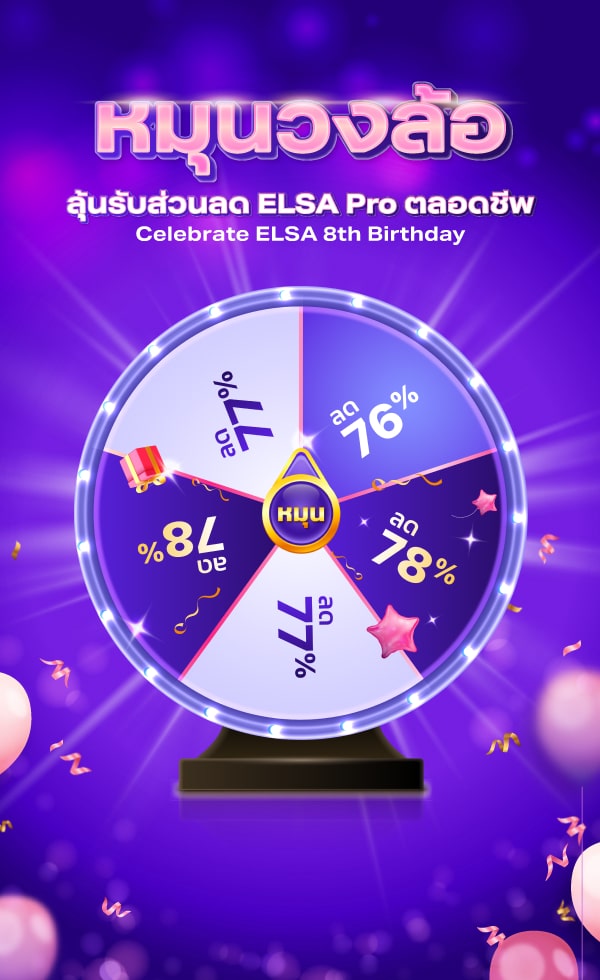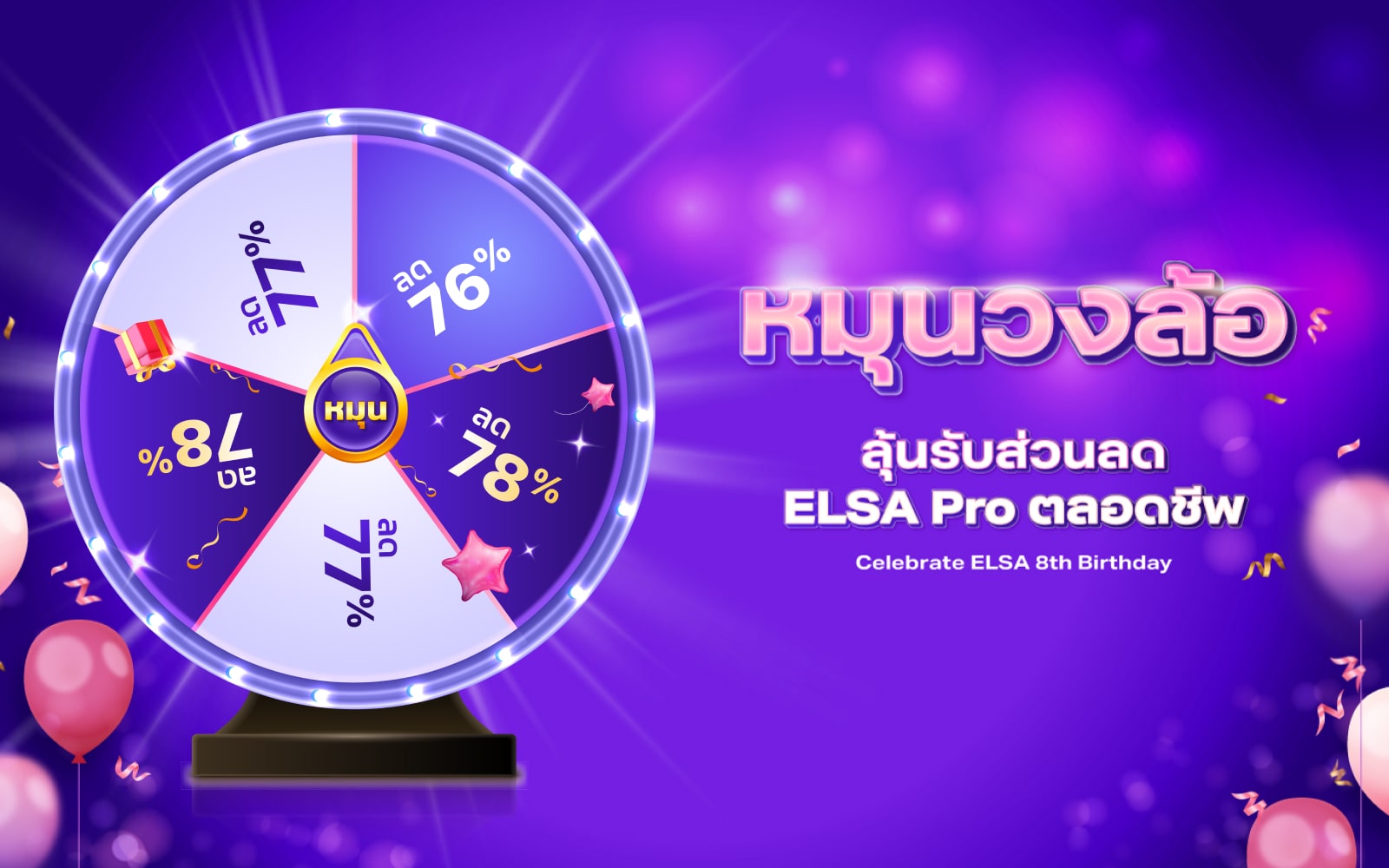ประโยคคำถาม (interrogative sentence) ในภาษาอังกฤษคืออะไร? มีประโยคคำถามประเภทใดบ้าง? นี่คือส่วนหนึ่งของพื้นฐานไวยากรณ์ ที่คุณจะต้องทำความเข้าใจเท่านั้นจึงจะสามารถตั้งคำถามที่ถูกต้องในการสื่อสารในชีวิตประจำวันได้ มาค้นหารายละเอียดกับ ELSA Speak ด้านล่างกันดีกว่า!
ประโยคคำถามในภาษาอังกฤษคืออะไร?

ประโยคคำถามในภาษาอังกฤษคือประโยคที่ถามข้อมูลเกี่ยวกับบุคคลหรือบางสิ่งบางอย่าง การใช้คำถามจะช่วยให้คุณยืนยันข้อมูลที่ถูกต้อง หลีกเลี่ยงความสับสน และสร้างปฏิสัมพันธ์ในการสนทนาประจำวัน ในการจบประโยคคำถาม เราจะใส่เครื่องหมายคำถาม (?)
สอบก่อนเข้าฟรี

ตัวอย่างประโยคคำถาม :
- Do you like coffee? (คุณชอบกาแฟไหม?)
- You look so tired, you worked late last night, didn’t you? (คุณดูเหนื่อยมากนะ เมื่อคืนคุณทำงานดึกใช่ไหม?)
ประเภทของประโยคคำถามในภาษาอังกฤษ
ประโยคคำถามรูปแบบ Yes/No (Yes/No Question)
สำหรับกริยา Verb to be
โครงสร้างประโยคคำถามของกริยา Verb to be
| Tobe + S+ O+…? -> Yes, S + tobe. -> No, S + tobe not. |
ตัวอย่าง
- Are you happy? (คุณมีความสุขไหม?)
- Is he handsome? (เขาหล่อไหม?)
- Is the fish fresh? (ปลาสดไหม?)
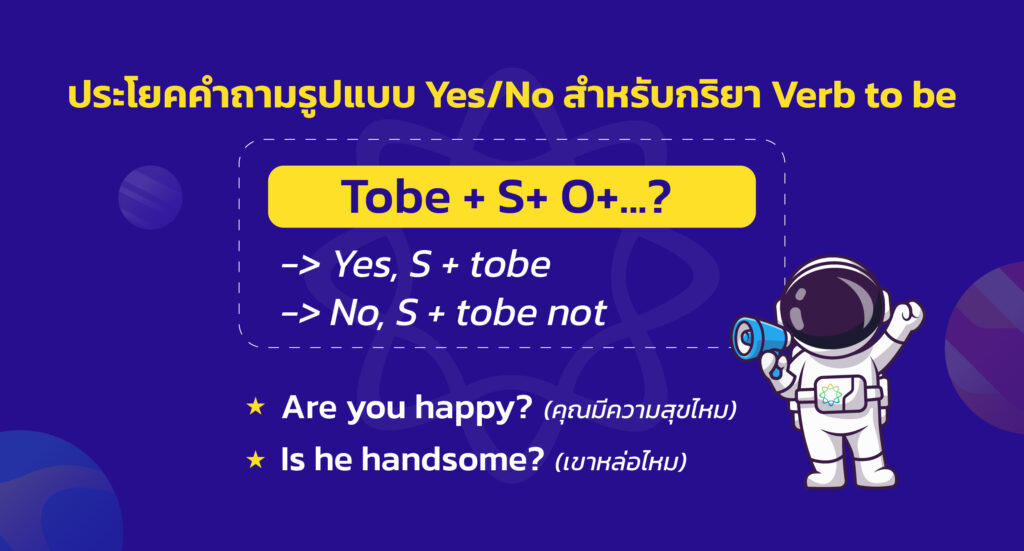
สำหรับคำกริยาทั่วไป
| กาล (Tenses) | โครงสร้าง | ตัวอย่าง |
| กาลปัจจุบัน (Simple Present) | คำถาม: Do/Does + S + V ? | Do you like coffee? (คุณชอบกาแฟไหม?) |
| คำตอบ: Yes, S + do/does. No, S + do/does + not. | Yes, I do. (ใช่ ฉันชอบ) No, I don’t. (ไม่ ฉันไม่ชอบ) | |
| ปัจจุบันกาลต่อเนื่อง (Present Continuous) | คำถาม: Am/Is/Are + S + V-ing ? | Are you studying English? (คุณกำลังเรียนภาษาอังกฤษอยู่หรือเปล่า?) |
| คำตอบ: Yes, S + am/is/are. No, S + am/is/are + not. | Yes, I am. (ใช่ ฉันกำลังเรียนอยู่) No, I’m not. (ไม่ใช่ ฉันไม่ได้เรียน) | |
| ปัจจุบันสมบูรณ์ (Present Perfect) | คำถาม: Have/Has + S + V-ed/3 ? | Have you finished your homework? (คุณทำการบ้านเสร็จหรือยัง?) |
| คำตอบ: Yes, S + have/has. No, S + have/has + not. | Yes, I have. (ใช่ฉันทำการบ้านเสร็จแล้ว) No, I haven’t. (ไม่ ฉัน ทำการบ้านยังไม่เสร็จ) | |
| ปัจจุบันสมบูรณ์แบบต่อเนื่อง (Present Perfect Continuous) | คำถาม: Have/Has + S + been + V-ing ? | Has she been working here for a long time? (เขาทำงานที่นี่มานานหรือยัง?) |
| คำตอบ: Yes, S + have/has been. No, S + have/has + not + been. | Yes, she has. (ใช่ เขาทำงานที่นี่มานานแล้ว) No, she hasn’t. (ไม่ เขาไม่ได้ทำงานที่นี่มานานแล้ว) | |
| อดีตกาล (Simple Past) | คำถาม: Did + S + V ? | Did you go to the party?(คุณได้ไปงานปาร์ตี้มาไหม?) |
| คำตอบ: Yes, S + did. No, S + did + not. | Yes, I did. (ใช่ฉันไปมาแล้ว) No, I didn’t. (ไม่ ฉันไม่ไป) | |
| อดีตกาลต่อเนื่อง (Past Continuous) | คำถาม: Was/Were + S + V-ing ? | Were they watching TV at 8 p.m.? (พวกเขาดูทีวีตอน 2 ทุ่มใช่ไหม?) |
| คำตอบ: Yes, S + was/were. No, S + was/were + not. | Yes, they were. (ใช่ พวกเขาดูทีวี) No, they weren’t. (ไม่พวกเขาไม่ดูทีวี) | |
| อดีตก่อนหน้า (Past Perfect) | คำถาม: Had + S + V-ed/3 ? | Had he left before you arrived? (เขาออกไปก่อนที่คุณจะมาถึงเหรอ?) |
| คำตอบ: Yes, S + had. No, S + had + not. | Yes, he had. (ใช่ เขาออกไปแล้ว) No, he hadn’t. (ไม่ เขายังไม่ ไป) | |
| อดีตกาลสมบูรณ์แบบต่อเนื่อง (Past Perfect Continuous) | คำถาม: Had + S + been + V-ing ? | Had they been waiting for long? (พวกเขาจะรอนานหรือเปล่า?) |
| คำตอบ: Yes, S + had been. No, S had + not + been. | Yes, they had. (ใช่ พวกเขารอนานมาแล้ว) No, they hadn’t. (ไม่ พวกเขาไม่ได้รอนานเลย) | |
| อนาคตกาล (Simple Future) | คำถาม: Will + S + V ? | Will you help me? (คุณจะช่วยฉันไหม?) |
| คำตอบ: Yes, S + will. No, S + will + not. | Yes, I will. (ใช่ ฉันจะช่วยคุณ) No, I won’t. (ไม่ ฉันไม่ช่วยคุณ) | |
| อนาคตกาลต่อเนื่อง (Future Continuous) | คำถาม: Will + S + be + V-ing ? | Will she be coming tomorrow? (พรุ่งนี้เขาจะมาไหม?) |
| คำตอบ: Yes, S + will be. No, S + will not be. | Yes, she will. (ใช่ เขาจะมา) No, she won’t. (ไม่ เขาไม่มา) | |
| อนาคตกาลที่สมบูรณ์แล้ว (Future Perfect) | คำถาม: Will + S + have + V-ed/3 ? | Will they have finished by noon? (เขาจะเสร็จภายในเที่ยงไหม?) |
| คำตอบ: Yes, S will have. No, S will not have. | Yes, they will. (ใช่ เขาจะเสร็จ ) No, they won’t. (ไม่ เขาจะไม่เสร็จ) | |
| อนาคตกาลสมบูรณ์ต่อเนื่อง (Future Perfect Continuous) | คำถาม: Will + S + have been + V-ing ? | Will you have been working here for a year? (คุณจะทำงานที่นี่เป็นเวลาหนึ่งปีหรือเปล่า?) |
| คำตอบ: Yes, S + will have been. No, S + will not have been. | Yes, I will. (ใช่ ฉันจะทำ) No, I won’t. (ไม่ ฉันจะไม่ทำ) |
สำหรับกริยาพิเศษ (Modal verbs)
โครงสร้าง
| Modal verbs + S + V(bare) + O … ? -> Yes, S + modal verb. -> No, S + modal verb + not. |
ตัวอย่าง:
- Can you help me with this report? (คุณช่วยฉันทำรายงานนี้ได้ไหม?)
-> Yes, I can. (ได้ค่ะ/ครับ ฉันจะช่วยเอง)
-> No, I can’t. (ไม่ได้ค่ะ/ครับ ฉันช่วยไม่ได้)
- Would you like to join us for dinner? (คุณอยากจะมาร่วมรับประทานอาหารเย็นกับพวกเราไหม?)
-> Yes, I would. (ได้สิ ฉันจะไปร่วม)
-> No, I wouldn’t. (ไม่ ฉันไปร่วมไม่ได้)
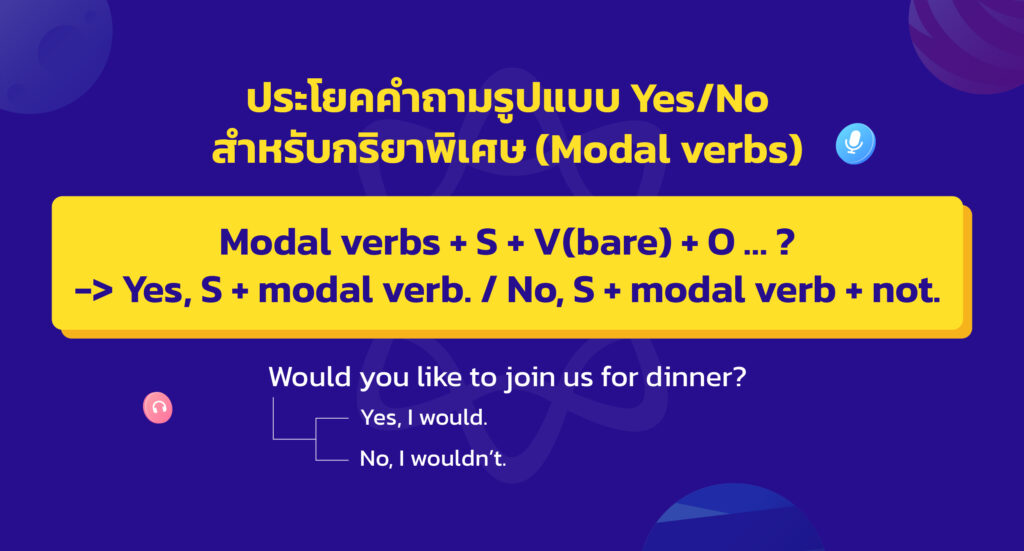
ประโยคคำถาม Wh-
| โครงสร้าง | ความหมาย | ตัวอย่าง | |
| What | What + be + S + … ? | สอบถามข้อมูล (อะไร) | What is your name?(คุณชื่ออะไร?) |
| What + ? | ขอให้พูดซ้ำบางสิ่งบางอย่าง | What? I can’t hear you.(อะไรนะ ฉันไม่ได้ยิน) | |
| What…for | What + did + S + do + that + for ? | ถามเหตุผล (ทำไม เพื่ออะไร) | What did you do that for?(คุณทำอย่างนั้นเพื่ออะไร?) |
| When/What time | When/What time + be + S + … ? | ถามเวลา (When: เมื่อใด/What time: เวลาใด / กี่โมง) | When were you born?(คุณเกิดเมื่อไหร่?) What time did you leave home yesterday?(เมื่อวานคุณออกจากบ้านกี่โมง?) |
| Where | Where + do/does + S + … ? | ถามเกี่ยวกับสถานที่ (ที่ไหน) | Where do you live?(คุณอาศัยอยู่ที่ไหน?) |
| Which | Which + do/does + S + … ? | ถามตัวเลือก (อันไหน คนไหน) | Which color do you like?(คุณชอบสีไหน?) |
| Who | Who + V-ed/3 ? | ถามเกี่ยวกับบุคคล – ประธาน (ใคร) | Who opened the door?(ใครเปิดประตู?) |
| Whom | Whom + did + S + see ? | ถามเกี่ยวกับบุคคล – กรรม (ใคร) | Whom did you see yesterday?(เมื่อวานคุณเห็นใครบ้าง?) |
| Whose | Whose + be + … ? | ถามถึงความเป็นเจ้าของ (ของใคร) | Whose is this car?(รถคันนี้เป็นของใคร?) |
| Why | Why + do/does + S + … ? | ถามเหตุผล (ทำไม) | Why do you say that?(ทำไมคุณถึงพูดอย่างนั้น?) |
| Why don’t | Why don’t + S + V ? | ข้อเสนอแนะ | Why don’t we go out tonight?(ทำไมเราไม่ออกไปข้างนอกกันคืนนี้ล่ะ?) |
| How | How + does/do + S + V ? | ถามวิธีการทำ (อย่างไร) | How does this work?(มันทำงานอย่างไร?) |
| How far | How far + be + S + from … ? | ถามระยะทาง (ไกลแค่ไหน) | How far is Hai Phong from Hanoi?(Hai Phong อยู่ห่างจาก Ha Noi แค่ไหน?) |
| How long | How long + will + it + take + to V ? | ถามระยะเวลา (นานแค่ไหน) | How long will it take to fix my car?(การซ่อมรถของฉันจะใช้เวลานานเท่าไร?) |
| How many | How many + be + there + … ? | ถามปริมาณ + จำนวน N (เท่าไหร่) | How many cars are there?(มีรถกี่คัน?) |
| How much | How much + do/does + S + have ? | ถามปริมาณ + N นับไม่ได้ (เท่าไหร่) | How much money do you have?(คุณมีเงินเท่าไหร่?) |
| How old | How old + be + S ? | ถามอายุ (อายุเท่าไหร่) | How old are you?(คุณอายุเท่าไร?) |
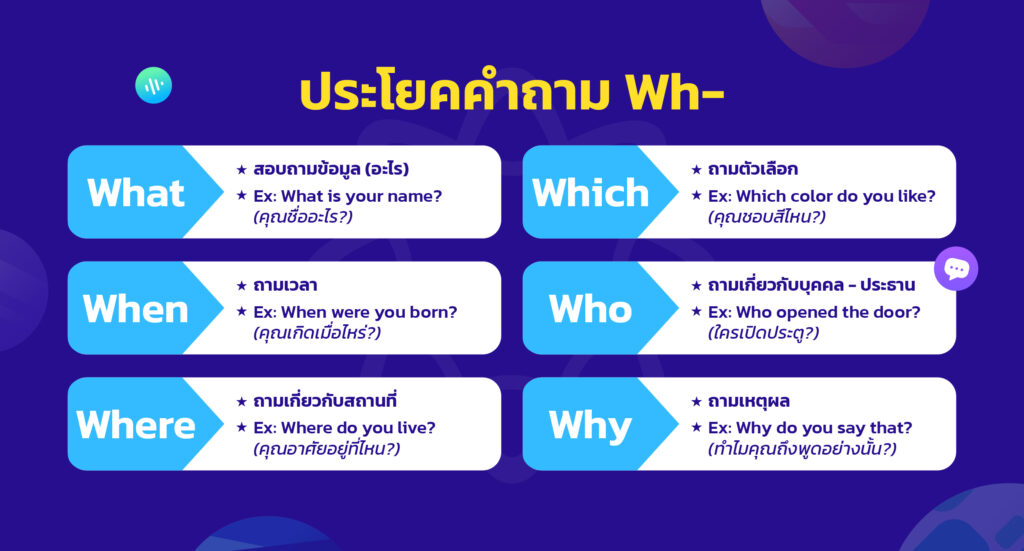
>>> Read more:
- WH question คืออะไร วิธีการใช้ WH question พร้อมตัวอย่างแบบละเอียด
- AM PM คือะไร? วิธีใช้ AM PM อย่างถูกต้องในภาษาอังกฤษ พร้อมรายละเอียดเพิ่มเติม
ประโยคคำถามเชิงคำถามประเภททางเลือก
ในประเภทประโยคคำถามในภาษาอังกฤษ เรายังมีคำถามแบบเลือกตอบ “สิ่งนี้หรือสิ่งนั้น” อีกด้วย คุณสามารถระบุคำถามประเภทนี้ได้ด้วยคำว่า “or”
โครงสร้าง
| Question word/Verb + Subject + Option 1 + or + Option 2? -> Subject + Verb + Option (1/2) |
ตัวอย่าง
- Shopping alone or shopping with friends, which do you prefer? (ช้อปปิ้งคนเดียวหรือช้อปปิ้งกับเพื่อน คุณชอบแบบไหนมากกว่ากัน?)
- Should I wear sandals or high heels to this event? (ไปงานนี้ฉันควรใส่รองเท้าแตะหรือรองเท้าส้นสูง ?)
คำถามแท็ก (Tag Question)
คำถามแท็กเป็นรูปแบบประโยคคำถามในภาษาอังกฤษที่พบบ่อย ซึ่งคุณต้องเข้าใจว่าคำถามประเภทนี้ตั้งขึ้นตามหลักการ: หากประโยคหลักเป็นประโยคยืนยัน คำถามแท็กจะเป็นเชิงลบและในทางกลับกัน
| Affirmative Statement (ประโยคบอกเล่า) + Auxiliary Verb (กริยานุเคราะห์) + Not + Subject + ? -> Yes, + Subject + Auxiliary Verb (กริยานุเคราะห์) -> No, + Subject + Auxiliary Verb (กริยานุเคราะห์) + Not |
ตัวอย่าง
- He is an art lover, isn’t he? (เขาเป็นคนรักศิลปะใช่ไหม?)
- You lost your keys, didn’t you? (คุณทำกุญแจหายใช่ไหม?)
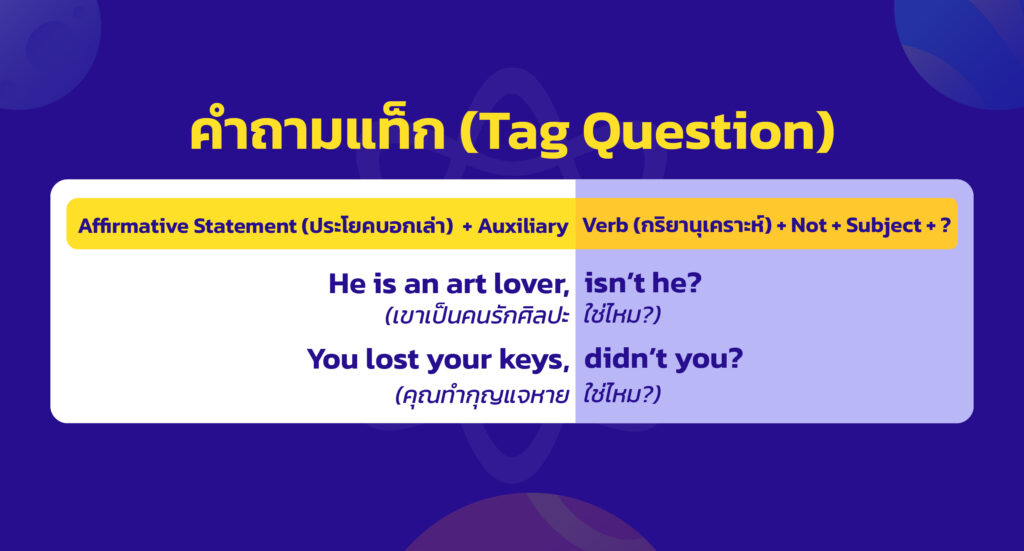
50+ ประโยคคำถามภาษาอังกฤษทั่วไปตามหัวข้อ
ด้านล่างนี้เป็นการถามคำถามทั่วไปในภาษาอังกฤษเพื่อใช้อ้างอิง:
| หัวข้อ | คำถาม | คำตอบ |
| Personal Information (ข้อมูลส่วนตัว) | What’s your name? (คุณชื่ออะไร?) | Peter. (ปีเตอร์) |
| Where are you from? Where do you come from? (คุณมาจากไหน?) | I’m from … I come from … (ฉันมาจาก…) | |
| What’s your surname? What’s your family name? (นามสกุลของคุณคืออะไร?) | Smith. (สมิธ) | |
| What’s your first name? (ชื่อจริงของคุณคืออะไร?) | Tom. (ทอม) | |
| What’s your address? (ที่อยู่ของคุณคืออะไร?) | 7865 NW Sweet Street (7865 NW Sweet Street) | |
| Where do you live? (คุณอาศัยอยู่ที่ไหน?) | I live in San Diego. (ฉันอาศัยอยู่ในซานดิเอโก) | |
| What’s your telephone number? (หมายเลขโทรศัพท์ของคุณคืออะไร?) | 209-786-9845 | |
| How old are you? (คุณอายุเท่าไหร่?) | Twenty-five. (อายุยี่สิบห้า) I’m twenty-five years old. ฉันอายุยี่สิบห้าปี) | |
| When were you born? (คุณเกิดเมื่อไหร่?) Where were you born? (คุณเกิดที่ไหน?) | I was born in 1961. (ฉันเกิดเมื่อปีพ.ศ. 2504) I was born in Seattle. (ฉันเกิดที่ซีแอตเทิล) | |
| Are you married? (คุณแต่งงานแล้วหรือยัง?) What’s your marital status? (คุณมีสถานภาพสมรสอย่างไร?) | I’m single. (ฉันโสด) | |
| What do you do? What’s your job? (คุณทำงานอะไร?) | I’m a librarian. (ฉันเป็นบรรณารักษ์) | |
| Where did you go? (คุณไปไหน?) | I went to a friend’s house. (ฉันไปบ้านเพื่อน) | |
| What did you do? (คุณทำอะไร?) | We played video games. (พวกเราเล่นวิดีโอเกม) | |
| Where were you? (คุณอยู่ที่ไหน?) | I was in New York for the weekend. (ฉันอยู่ที่นิวยอร์กในช่วงสุดสัปดาห์) | |
| Have you got a car / job / house / etc.? (คุณมีรถ / งาน / บ้าน / ฯลฯ หรือไม่?) | Yes, I’ve got a car / job / house / etc. (ใช่ ฉันมีรถ / งาน / บ้าน / ฯลฯ) | |
| Have you got any children / friends / books / etc.? (คุณมีลูก / เพื่อน / หนังสือ / ฯลฯ หรือไม่?) | Yes, I’ve got three children – two boys and a daughter. (ใช่ ฉันมีลูกสามคน – ผู้ชายสองคนและลูกสาวหนึ่งคน) | |
| Can you play tennis / golf / football / etc.? (คุณเล่นเทนนิส / กอล์ฟ / ฟุตบอล / ฯลฯ ได้ไหม?) | Yes, I can play tennis / golf / football. (ใช่ ฉันเล่นเทนนิส/กอล์ฟ/ฟุตบอลได้) | |
| Can you speak English / French / Japanese / etc.? (คุณพูดภาษาอังกฤษ / ฝรั่งเศส / ญี่ปุ่น / ฯลฯ ได้ไหม?) | No, I can’t speak English / French / Japanese. (ไม่ ฉันพูดภาษาอังกฤษ/ฝรั่งเศส/ญี่ปุ่นไม่ได้) | |
| Could you speak English / French / Japanese when you were five / two / fifteen / etc. years old? (คุณพูดภาษาอังกฤษ / ฝรั่งเศส / ญี่ปุ่นได้ไหมเมื่อคุณอายุห้า / สอง / สิบห้า / ฯลฯ) | Yes, I could speak English / French / Japanese when I was five / two / fifteen years old. (ใช่ ฉันพูดภาษาอังกฤษ/ฝรั่งเศส/ญี่ปุ่นได้ตอนอายุห้า/สอง/สิบห้าปี) | |
| Shopping (ช้อปปิ้ง) | How can I help you? ((ฉันสามารถช่วยคุณได้อย่างไร?) May I help you? (ฉันช่วยคุณได้ไหม?) | Yes, I’m looking for a sweater. (ใช่ ฉันกำลังมองหาเสื้อสเวตเตอร์) |
| Can I try it on? (ฉันลองสวมดูได้ไหม?) | Sure, the changing rooms are over there. (แน่นอน ห้องเปลี่ยนเสื้อผ้าอยู่ตรงนั้น) | |
| How much does it cost? How much is it? (ราคาเท่าไหร่?) | It’s $45. (ราคา 45 ดอลลาร์) | |
| How would you like to pay? (คุณต้องการชำระเงินด้วยวิธีใด?) | By credit card. (ชำระด้วยบัตรเครดิต) | |
| Can I pay by credit card / check / debit card? (ฉันสามารถชำระเงินด้วยบัตรเครดิต / เช็ค / บัตรเดบิตได้หรือไม่?) | Certainly, We accept all major cards. (แน่นอน เรารับบัตรเครดิตหลักๆทุกประเภท) | |
| Have you got something bigger / smaller / lighter / etc.? (คุณมีสินค้าที่ใหญ่กว่า / เล็กกว่า / เบากว่า / ฯลฯ หรือไม่?) | Certainly, we’ve got bigger / smaller / lighter sizes as well. (แน่นอน เรามีขนาดที่ใหญ่กว่า/เล็กกว่า/เบากว่าด้วย) | |
| Asking Something Specific (การถามบางสิ่งบางอย่างที่เฉพาะ) | What’s that? (นั่นอะไร?) | It’s a cat. (นั้นคือแมว) |
| What time is it? (ตอนนี้กี่โมงแล้ว?) | It’s three o’clock. (ตอนนี้สามโมงแล้ว) | |
| Can / May I open the window? (ฉันเปิดหน้าต่างได้ไหม?) | Certainly, It’s hot in here. (ได้เลย เพราะว่าที่นี่ร้อนมาก) | |
| Is there a bank / supermarket / pharmacy / etc. near here? (มีธนาคาร / ซูเปอร์มาร์เก็ต / ร้านขายยา / ฯลฯ ใกล้ๆ ที่นี่ไหม? ) | Yes, There is a bank / supermarket / pharmacy on the next corner next to the post office. (มีสิ ใกล้ๆ นี้ มีธนาคาร / ซูเปอร์มาร์เก็ต / ร้านขายยาอยู่ตรงมุมถัดไปถัดจากที่ทำการไปรษณีย์) | |
| Where is the nearest bank / supermarket / pharmacy / etc.? (ธนาคาร / ซูเปอร์มาร์เก็ต / ร้านขายยา / ฯลฯ ที่ใกล้ที่สุดอยู่ที่ไหน?) | The nearest bank / supermarket / pharmacy is on 15th street. (ธนาคาร / ซูเปอร์มาร์เก็ต / ร้านขายยาที่ใกล้ที่สุดอยู่บนถนนสายที่ 15) | |
| Who wrote / invented / painted / etc. the …? (ใครเป็นคนเขียน / คิดค้น / วาดภาพ / ฯลฯ …?) | Hemingway wrote “The Sun Also Rises”. (เฮมิงเวย์เขียนเรื่อง “The Sun Also Rises”) | |
| Is there any water / sugar / rice / etc.? (มีน้ำ / น้ำตาล / ข้าว / ฯลฯ ไหม?) | Yes, there’s a lot of water / sugar / rice left. (มีสิ มีน้ำ / น้ำตาล / ข้าวเหลือเยอะมาก) | |
| Are there any apples / sandwiches / books / etc.? (มีแอปเปิ้ล / แซนวิช / หนังสือ / ฯลฯ ไหม?) | No, there aren’t any apples / sandwiches / books left. (ไม่มีเลย แอปเปิ้ล / แซนด์วิช / หนังสือเหลือไม่เยอะมาก) | |
| Is this your / his / her / etc. book / ball / house / etc.? (นี่คือหนังสือ / ลูกบอล / บ้าน / ฯลฯ ของคุณ / เขา / เธอ / ฯลฯ?) | No, I think it’s his ball. (ไม่ ฉันคิดว่าเป็นลูกบอลของเขา) | |
| Whose is this / that? (นี่ / นั่น ของใคร?) | It’s Jack’s. (เป็นของแจ็ค) | |
| Questions with ‘Like’ (คำถามด้วย “like”) | What do you like? (คุณชอบอะไร?) | I like playing tennis, reading and listening to music. (ฉันชอบเล่นเทนนิส อ่านหนังสือและฟังเพลง) |
| What does he look like? (เขาหน้าตาเป็นอย่างไร?) | He’s tall and slim. (เขาสูงและผอม) | |
| What would you like? (คุณชอบอะไร?) | I’d like a steak and chips. (ฉันชอบสเต็กและมันฝรั่งทอด) | |
| What is it like? (มันดูเป็นไงบ้าง?) | It’s an interesting country. (เป็นประเทศที่น่าสนใจ) | |
| What’s the weather like? (อากาศเป็นยังไง?) | It’s raining at the moment. (ตอนนี้ฝนตกอยู่) | |
| Would you like some coffee / tea / food? (คุณอยากดื่มกาแฟ / ชา / อาหารไหม?) | Yes, thank you. I’d like some coffee / tea. (อยากสิ ขอบคุณนะ ฉันอยากดื่มกาแฟ/ชา) | |
| Would you like something to drink / eat? (คุณอยากดื่ม / กินอะไรไหม?) | Thank you. Could I have a cup of tea? (ขอบคุณนะ ฉันขอชาสักถ้วยได้ไหม?) | |
| Asking for an Opinion (คำถามเพื่อขอความคิดเห็น) | What’s it about? (เป็นเรื่องเกี่ยวกับอะไร?) | It’s about a young boy who encounters adventures. (เป็นเรื่องเกี่ยวกับเด็กชายที่เผชิญกับการผจญภัย) |
| What do you think about your job / that book / Tim / etc.? (คุณคิดอย่างไรเกี่ยวกับงานของคุณ / หนังสือเล่มนั้น / ทิม / ฯลฯ ?) | I thought the book was very interesting. (ฉันคิดว่าหนังสือเล่มนี้น่าสนใจมาก) | |
| How big / far / difficult / easy is it? (มันใหญ่ / ไกล / ยาก / ง่ายแค่ไหน ?) | The test was very difficult. (แบบทดสอบยากมาก) | |
| How big / far / difficult / easy are they? (มันใหญ่ / ไกล / ยาก / ง่ายแค่ไหน ?) | The questions were very easy. (คำถามง่ายมาก) | |
| How was it? (เป็นอย่างไรบ้าง?) | It was very interesting. (มันน่าสนใจมาก) | |
| What are you going to do tomorrow / this evening / next week / etc.? (คุณจะทำอะไรพรุ่งนี้ / เย็นนี้ / สัปดาห์หน้า / ฯลฯ ?) | I’m going to visit some friends next weekend. (ฉันจะไปเยี่ยมเพื่อนๆ สุดสัปดาห์หน้า) | |
| Suggestions (ข้อเสนอ) | What shall we do this evening? (เย็นนี้เราจะทำอะไร ?) | Let’s go see a film. (ไปดูหนังกันเถอะ) |
| Why don’t we go out / play tennis / visit friends / etc. this evening? (ทำไมเราไม่ออกไปข้างนอก / เล่นเทนนิส / เยี่ยมเพื่อน / ฯลฯ เย็นนี้ล่ะ ?) | Yes, that sounds like a good idea. (ใช่แล้ว ฟังดูเป็นความคิดที่ดีนะ) |

ELSA Premium Lifetime
9,999 บาท -> 6,799 บาท

ELSA Pro Lifetime
3,659 บาท -> 2,927 บาท

ELSA Premium 1 ปี
8,497 บาท -> 3,160 บาท

ELSA Pro 1 year
2,499 บาท -> 1,628 บาท
แบบฝึกหัดประโยคคำถามในภาษาอังกฤษ
แบบฝึกหัด
แบบฝึกหัดที่ 1: เปลี่ยนประโยคบอกเล่าเป็นประโยคคำถาม
- My sister always cooks food that I like.
- Mira is an English teacher at a famous university.
- My mother sings very well
- I drove more than 80km to meet her.
- She worked so hard to buy a new car.
แบบฝึกหัดที่ 2. เติมคำที่เหมาะสมลงในช่องว่าง
- ………….you text me?
- ………….Mary know how to use a laptop?
- ………….. the vegetables you buy at the supermarket?
- ……………car is this?
- ……………she a doctor or nurse?
แบบฝึกหัดที่ 3: สร้างคำถามเกี่ยวกับคำที่ขีดเส้นใต้ต่อไปนี้
1/ She is buying two chickens at the supermarket.
2/ My son’s favorite subject is Biology.
3/ Yes, she is. (She is good at singing).
4/ I go to the barber’s once a month.
5/ He learnt Music in primary school.
6/ The weather is great.
7/ I need a day off to recharge my batteries.
8/ It took him 5 hours to travel by bus.
9/ She headed to the restaurant because she was hungry.
10/ The water bottle is 20 baht.
เฉลย
แบบฝึกหัดที่ 1
- Who always cooks food that you like?
- Who is an English teacher at a famous university?
- Does your mother sing well?
- What did you drive more than 80 km for?
- What does she work hard for?
แบบฝึกหัดที่ 2
| 1. Will | 2. Does | 3. Are | 4. Whose | 5. Is |
แบบฝึกหัดที่ 3
1/ How many chickens is she buying at the supermarket?
2/ What is your son’s favorite subject?
3/ Is she good at singing?
4/ How often do you go to the barber’s?
5/ What did he do in primary school?
6/ How is the weather?
7/ Why do you need a day off?
8/ How long did it take him to travel by bus?
9/ Why did she head to the restaurant?
10/ How much is the water bottle?
ข้างต้นเป็นความรู้เกี่ยวกับ ประโยคคำถาม ภาษาอังกฤษ หวังว่าการแบ่งปันข้างต้นจะช่วยให้คุณเรียนรู้ภาษาอังกฤษได้อย่างมีประสิทธิภาพ นอกจากนี้อย่าลืมเข้ามาที่ ELSA Speak เป็นประจำเพื่ออัปเดทความรู้การเรียนรู้ภาษาอังกฤษของคุณทุกวัน!
